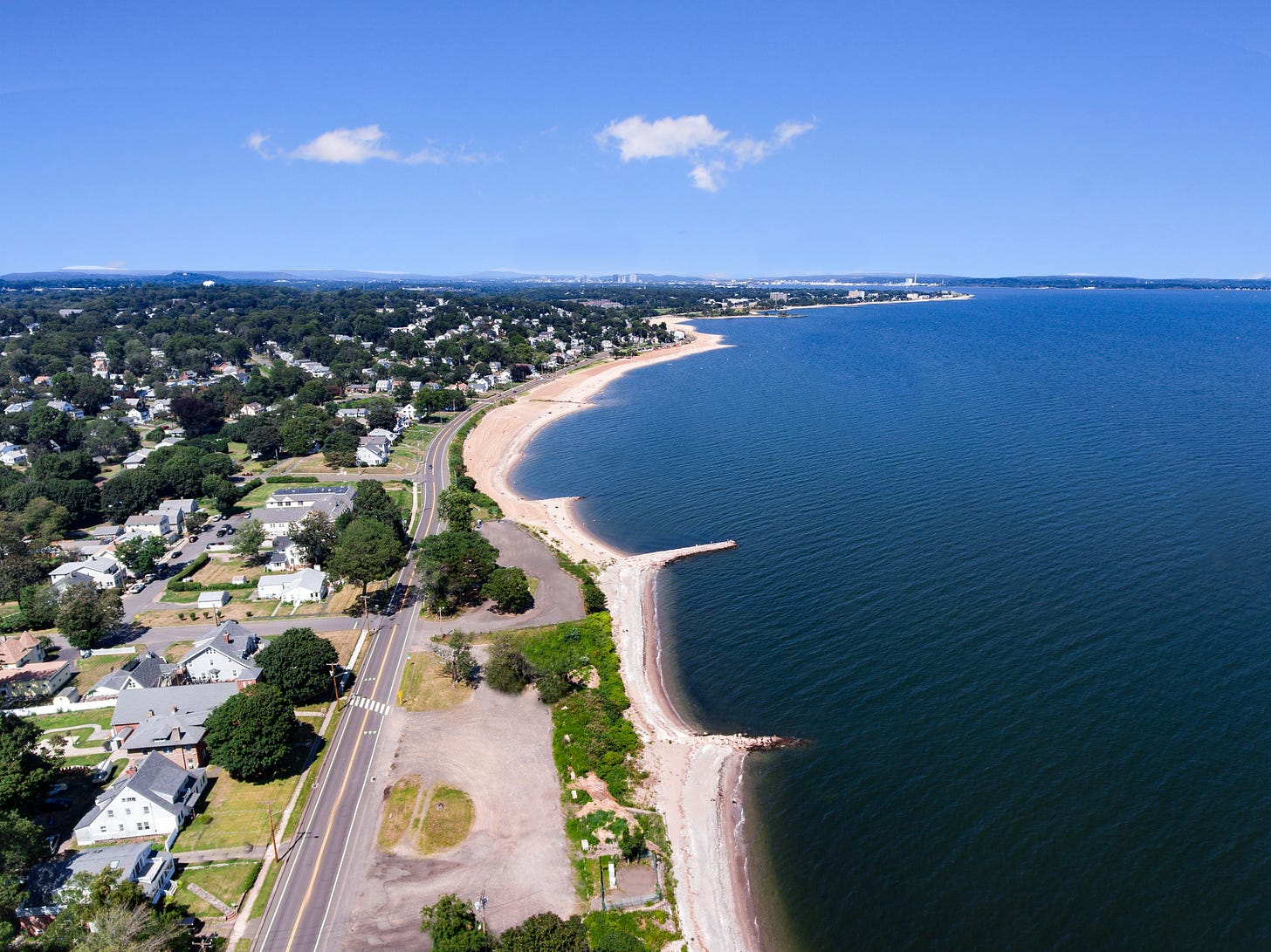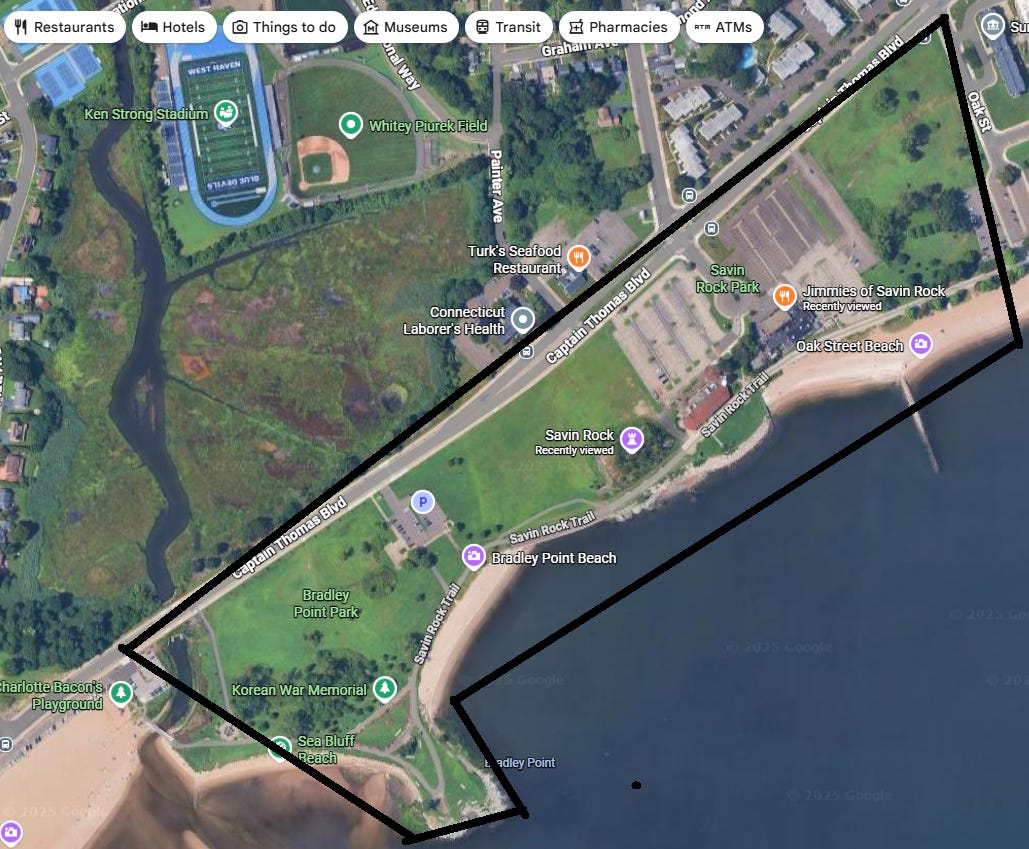Two Stories about West Haven
Things are backwards

West Haven, Connecticut. Located on the Long Island Sound with a long stretch of beautiful beach, West Haven should be a popular summer destination. It’s just outside of New Haven, and the picture above makes clear there are plenty of opportunities to have fun in the sun. Once upon a time, West Haven was a destination, home of the Savin Rock Amusement Park, which was visited by over a million visitors a year and contained “a bandstand, a fountain, an observatory, a wooded area for picnics, and a carousel which was revolved first by manpower and later by a horse on a treadmill. Amusements were built by other businessmen, and soon the park had a zoo, a museum, and a dance hall. Promoters organized cock fights, horse races, and prize fights.”
Today, it’s a husk of its former self. The New Haven area was hit hard by The Great Hurricane of 1938. Wealthy New Yorkers and New Englanders began to travel farther afield as the road and air network expanded after World War II. The Savin Rock Amusement Park closed in 1966 and was demolished. Today, the area still has a nice beach, but due to the insane parking rules that most Connecticut towns employ to keep non-residents away, it is sparsely visited. The Savin Rock area, far from a bustling hub of hotel guests and curios, is instead a mostly undeveloped space:
Over the last 60 years, residents have argued about what to do with the space. Should it be left as a park? Should it be redeveloped into commercial space? Should it be turned into high-rise apartment buildings? The arguments are endless, as everyone has a different view and no one group has anything close to a majority. So for the time being, it’s a park, which may not be most people’s preferred outcome, but it’s few, if anyone’s, worst outcome, so I guess that’s somewhat of a win.
While Savin Rock is mostly undeveloped, there are a few commercial spaces. One is a popular restaurant named Jimmies, which has been on the shore since the 1970s. Another is a former restaurant, then conference center, now abandoned building. In 2022, the city proudly announced that a nearby brewery with longstanding ties to the area was going to redevelop the abandoned conference center. The New England Brewing Company, colloquially known as NEBCO, was going to move from nearby Woodbridge and redevelop the space. Instead of an abandoned conference center with a faulty roof, a large brewery, restaurant, and taproom would occupy the space.
This would have been a great boon for West Haven. The city wins by having a new high-profile business move in. Residents have a new third place to visit. An abandoned building in a gorgeous location is replaced. Who could be against such a deal? The nearby restaurant, of course. The family that owns Jimmies was aghast that they were about to lose their monopoly over the shore. How dare a rival business move in and renovate the eyesore next door! They, along with the West Haven Land Trust, sued. The deal with was off. Then NEBCO and city officials renegotiated to start a restaurant and taproom, but leave the brewing facilities elsewhere. The state agreed to pony up $900,000 to help refurbish the building. The deal was back on. Then Jimmies sued again. And again. Jimmies ultimately filed three appeals trying to keep an abandoned conference center abandoned. NEBCO finally threw in the towel. The deal was dead. And who can blame them? It was clear that one rival business can prevent a new one from opening indefinitely.
[December 2025 update: Jimmies, after over 100 years of operation, is now closed. Good riddance.]
That a restaurant can openly state that a rival business could be so popular that overflow parking could end up using a different business’s spots, and that this is grounds to prevent the business from opening, is absurd. The whole story is absurd. Yet it’s a microcosm for America today. We are a vetocracy - every member of society gets a veto. Nothing gets done.
Well, almost nothing.
What makes the NEBCO story all the more galling is what else has happened in West Haven. In 2013, Mayor John Picard proposed turning a different section of the shoreline into a high-end outlet mall. This seemed like a good idea. The area on New Haven Harbor had once been filled with industry but slowly hollowed out over the 20th century. By the 21st, the land was mostly abandoned. Eventually, “developers Sheldon Gordon and Ty Miller have proposed to build the $200 million, 347,826-square-foot waterfront development project in two phases, with about 60 stores and seven restaurants in the first phase and about 100 stores if both phases ultimately are built…The Haven would provide 800 full-time and 400 part-time jobs, plus 800 construction jobs using all Connecticut-based contractors.”
Again, what a great boon to a struggling city. The location of “The Haven” outlet mall was perfect. Right off the I-95 and on the water. The only problem? The developer wanted more than the abandoned industrial space. They wanted to extend the mall out to 1st Ave., which was residential. Some of the people who lived in 1st Ave. didn’t want to sell. So the city initiated eminent domain proceedings. The government forced out several homeowners, including one man who had lived in his house for over 50 years. Those houses were then razed and the land was prepared for development.
The mall was never built.
Today, people like to blame Covid as the killer of The Haven, but the reality was the mall was never going to be built. The property was ready for development in 2017, and nothing happened for years. Plans were redrawn and resubmitted, but no shovels ever hit the dirt. The reality was the developer never had the funding in place. The City of West Haven spent vast resources kicking out residents to ultimately replace their homes with empty lots. There aren’t Google street view photos available from before the houses vacated, but it’s easy to see what the area was compared to what it became:
A pleasant residential block was destroyed. For nothing.
I’m not sure how we arrived at a place where a business can use the government to keep a rival from opening, while at the same time, a developer can use the government to force people from their homes. Something has gone seriously wrong. We need to work as a society and determine what systems are in place that allow such uneven outcomes. Just complaining about “capitalism” or “corruption” isn’t going to do it. How do we allow abandoned buildings to be developed and prevent people from being forced from their homes? It shouldn’t be that hard.





I lived in Milford for quite a while, and West Haven always felt different when you got there. It's as if all the economic prosperity was sucked out of it and transferred to toney areas of Milford like near Silver Sands or Woodmont. The beaches in West Haven have now been notorious for drunken antics or drug use and the police have taken to clearing people off the beach or closing them altogether at Savin. You wonder if the Mayor there really wants the development and what it will take to bring West Haven back. It seems like there's just more and more poverty in New Haven and the greater area and less real sustainability.